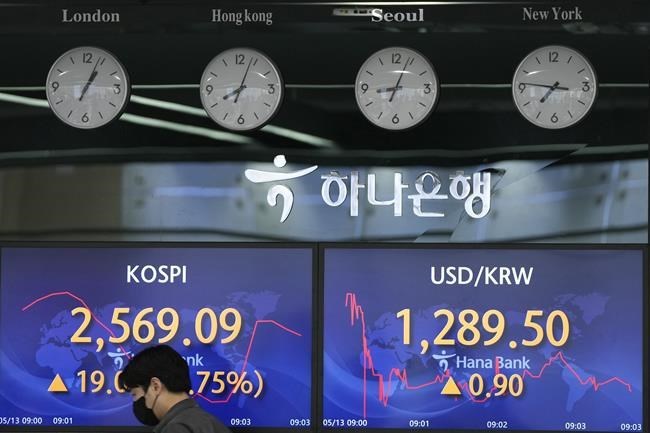TORONTO — Canada's main stock index staged a late rally to post its first winning week in two months despite enduring volatility over concerns about central bank interest rate hikes and warnings that inflation is hammering retailer profits.
The S&P/TSX composite index closed up 15.69 points to 20,197.61 after losing as much as almost 245 points in earlier trading. It was up less than 100 points for the week but off 9.1 per cent from its recent high.
Strong prices for commodities, including oil, has allowed the Toronto market — which is closed Monday for the Victoria Day holiday — to outperform its U.S. counterparts.
In New York, U.S. stock markets also climbed ahead of the afternoon close with the Dow Jones industrial average up 8.77 points at 31,261.90. The S&P 500 index was up 0.57 of a point at 3,901.36, while the Nasdaq composite was down 33.88 points at 11,354.62.
The three markets were down at least 2.9 per cent for the week. The S&P 500 slipped into bear territory to join Nasdaq but ended the day 19 per cent off its record high. Nasdaq is off nearly 30 per cent while the Dow is 15.4 per cent lower.
With no specific events driving Friday's moves, the weakness was attributed to a continuation of factors that created volatility all week.
Markets dropped after Federal Reserve chairman Jerome Powell said the central board will take whatever action that is required to tackle persistently high inflation.
"There is a concern that with the comment of Mr. Powell and the current level of inflation, which is not going down, that Mr. Powell is going to accelerate the increase of interest rates and we're going to see not only more interest rate increases, but we're going to see bigger interest rate increases," said Pierre Cléroux, chief economist for the Business Development Bank of Canada.
Recent profit warnings from retail giants Walmart and Target also shocked markets. The two companies said inflation and supply chain disruptions are eating away at profits, which raised worries about the rest of the sector.
In addition to higher costs for fuel, transportation and other inputs, retailers face supply disruptions because production is down for a second month in a row in China as manufacturing plants are closed with cities partially or totally closed to deal with increasing COVID-19 infections.
"Definitely there’s a worry about a recession because what really triggered the market going down over the last few weeks is the fact that it was concern about the interest rate before, but now we're seeing companies who are not making as much profit, even if volume of sales are up," Cléroux said in an interview.
"So it means that the current context is not proper to make profit and I think that's the biggest concern for the market."
Many sectors are facing challenges. Technology, in particular, has had a lot of difficulties with companies falling after being overvalued.
"It's a correction. But the concern is bigger than that. ... We don't know where the decline is going to stop, because it seems to be more than the correction of the market," Cléroux said.
Tech pared its losses Friday but still closed lower on the day as shares of Shopify Inc. decreased 7.1 per cent.
Health care was the biggest laggard, falling 2.3 per cent as Canopy Growth Corp. decreased 5.6 per cent.
Materials, which includes metals companies, forestry producers and fertilizer firms, was the second-weakest sector, losing almost one per cent as Nutrien Inc. decreased 4.1 per cent.
The June gold contract was up 90 cents at US$1,842.10 an ounce and the July copper contract was down nearly one cent at US$4.28 a pound.
Energy was up for the day as crude oil prices inched higher to help Imperial Oil shares gain 2.4 per cent.
The July crude contract was up 39 cents at US$110.28 per barrel and the June natural gas contract was down 22.5 cents at US$8.08 per mmBTU.
The Canadian dollar traded for 77.95 cents US compared with 78.07 cents US on Thursday.
The Dow is down for an eighth week while the losing streak for the other North American markets stands at seven.
Cléroux isn't sure markets have reached a bottom.
"It's hard to know when this is going to end (but) we need some good news."
This report by The Canadian Press was first published May 20, 2022.
Companies in this story: (TSX:IMO, TSX:WEED, TSX:SHOP, TSX:NTR, TSX:GSPTSE, TSX:CADUSD=X)
Ross Marowits, The Canadian Press

